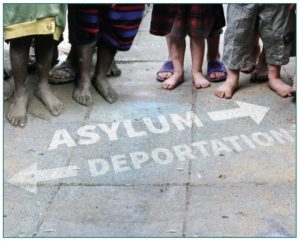Immigration Courts and our Partners
The Attorney General of Illinois has joined 15 other states and commonwealths as an amicus in the lawsuit filed by the states of Washington and Minnesota seeking to maintain the restraining order blocking key parts of the Executive Order barring entry into the United States of seven majority-Muslim countries.
Attorney General Madigan’s press release highlights the interests of the states joining the brief, noting that “Illinois is home to nearly 2 million immigrants who contribute to our state in invaluable ways.” The brief notes, particularly, that persons with valid visas for work and study, as well as travel, are being denied entry and damaging the free exchange of talent and skills, harming business, universities and research groups all over the U.S.
Attorney General Madigan also released a letter from her office to Governor Rauner, urging his office to protect all residents of Illinois, including immigrants, refugees, and asylum seekers as well as their employers and educational institutions. She requests that Illinois law enforcement resources not be diverted to federal immigration work and urges the Governor to affirm our commitment to anti-discrimination laws and protection from hate crimes.
 In the midst of this uncertainty, Chicago Appleseed worked with National Appleseed’s co-chair Steven Schulman, the law firm of Akin Gump, and other Appleseed Centers (South Carolina, Nebraska and Texas) to create and distribute a manual on deportation issues for immigration attorneys. The manual was completed in December 2016, and Centers will continue to update the manual as necessary. As we work with local and national collaborative efforts to increase pro bono representation in immigration bond courts and other proceedings, we hope the manual will prove invaluable.
In the midst of this uncertainty, Chicago Appleseed worked with National Appleseed’s co-chair Steven Schulman, the law firm of Akin Gump, and other Appleseed Centers (South Carolina, Nebraska and Texas) to create and distribute a manual on deportation issues for immigration attorneys. The manual was completed in December 2016, and Centers will continue to update the manual as necessary. As we work with local and national collaborative efforts to increase pro bono representation in immigration bond courts and other proceedings, we hope the manual will prove invaluable.
The recent crisis arising from the Executive Order has shown how well the legal community can respond to immediate needs and how important it is to have partners working at every level of the system. We’re proud of our colleagues and their efforts to increase representation in immigration bond court hearings.
